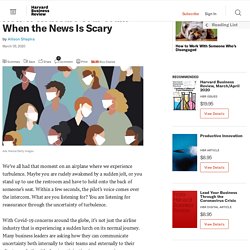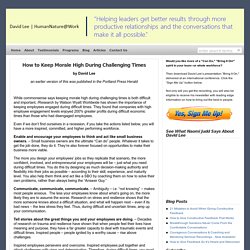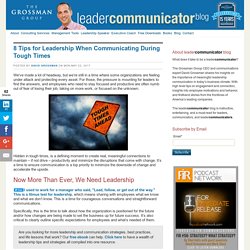

Work in Progress: Why Listening to Your Employees is Critical Right Now. 4 Tips for Not Touching Your Face - How to Stop Touching Your Face. Show Me the Science - How to Wash Your Hands. Why?

Because hands could become recontaminated if placed in a basin of standing water that has been contaminated through previous use, clean running water should be used 1. However, washing with non-potable water when necessary may still improve health 3. The temperature of the water does not appear to affect microbe removal; however, warmer water may cause more skin irritation and is more environmentally costly 4-6. Feeling Anxiety About Coronavirus? A Psychologist Offers Tips to Stay Clearheaded. As cases of the novel coronavirus infection, COVID-19, increase across the U.S., many people may be feeling anxious.

We spoke to UC San Francisco psychologist Elissa Epel, PhD, who studies stress, about the difference between anxiety and panic, and steps you can take to prevent panic and be prepared. Some anxiety is normal, but our anxious minds can easily go into panic mode “The good news about the widespread anxiety is that it is fueling big changes fast—many people in affected areas are being very careful to limit exposure. Anxiety fosters prevention and safeguarding behaviors. Coronavirus' business impact: Evolving perspective. COVID-19: Briefing note, March 9, 2020 A range of outcomes is possible.

Decision makers should not assume the worst. Less than ten weeks have passed since China reported the existence of a new virus to the World Health Organization. This virus, now known as SARS-CoV-2, causing COVID-19 disease, spread quickly in the city of Wuhan and throughout China. COVID 19 Facts and Insights March 9 final. Supporting Clients Through Coronavirus-related Stress - International Coach Federation. The Novel Coronavirus (COVID-19) is gradually becoming a part of our daily reality, for some more than others.

In addition to its effect on our external reality, it is also affecting our internal one by inviting additional stress and anxiety into our personal space. This new internal reality enters the coaching space with our client. How to Reassure Your Team When the News Is Scary. Executive Summary Communicating through uncertainty is an essential leadership skill, regardless of whether or not you have a formal leadership role.

In fact, the ability to communicate through uncertainty is part of what demonstrates your leadership readiness. The author recommends taking five steps: 1) Before you start communicating to others, take a minute to pause and breathe. 2) Put yourself in your audience’s shoes. 3) Seek out credible sources of information. 4) Speak clearly and confidently. 5) Provide your team with tangible action items. Discussing your own next steps or recommending next steps to your audience gives them a sense of control so they feel like they are contributing to stabilization. Use language such as, “Here are the steps we are taking” or “Here’s what you can do” to demonstrate action. How to Keep Morale High During Challenging Times. By David Lee an earlier version of this was published in the Portland Press Herald While commonsense says keeping morale high during challenging times is both difficult and important, /Research by Watson Wyatt Worldwide has shown the importance of keeping employees engaged during difficult times.

They found that companies with high employee engagement levels enjoyed 200% greater profits during difficult economic times than those who had disengaged employees. Even if we don’t find ourselves in a recession, if you take the actions listed below, you will have a more inspired, committed, and higher performing workforce. Enable and encourage your employees to think and act like small business owners. – Small business owners are the ultimate “Can do” people. 8 Tips for Leadership When Communicating During Tough Times. We've made a lot of headway, but we’re still in a time where some organizations are feeling under attack and protecting every asset.

For those, the pressure is mounting for leaders to find the answers, and employees who need to stay focused and productive are often numb out of fear of losing their job, taking on more work, or focused on the unknown. Hidden in tough times, is a defining moment to create real, meaningful connections to maintain – if not drive – productivity and minimize the disruptions that come with change. It’s a time to ensure communication is a top priority to minimize the downside of change and accelerate the upside. Now More Than Ever, We Need Leadership. How Leaders Can Communicate Tough Messages in their Organisation. No leader, business owner or HR director likes having difficult conversations with employees.

But business is not always paired with 'highs' and growth, and unfortunately, communicating tough messages is an inevitable part of being a leader in any organisation. When tough messages need to be shared, the internal response is dependent upon how well the message is communicated. At CommsMasters, we've helped empower leaders across many types of industries to make these conversations easier, and given them the tools they need to succeed. By using the tactics outlined below, you can be sure that you are communicating as efficiently and effectively as possible with your team.
Let's take a look at some of these best practices: Be Completely Honest. Delivering Difficult Messages the Right Way.